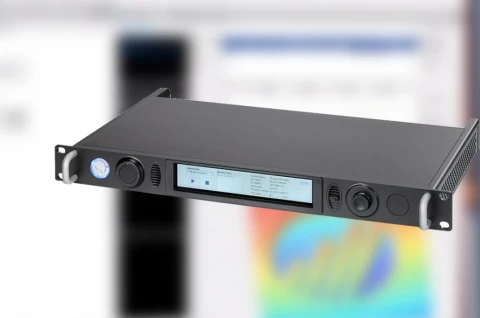ASC ARGnet Series Controller
Description
The ASC ARGnet Series Controller by Novanta Photonics represents the pinnacle of control and precision in laser-based systems for diagnostic, analytical, micromachining, and fine material processing applications. Engineered by ARGES, a globally recognized brand under Novanta Photonics, this next-generation system controller is meticulously designed to provide unparalleled performance and flexibility in controlling scan heads, lasers, sensors, actuators, and other peripherals.
At the heart of the ASC ARGnet Series Controller lies a powerful Quadcore 64bit-CPU, complemented by a 215k logic cell FPGA, enabling it to deliver high-power performance and adaptability to a wide range of tasks. This cutting-edge controller boasts a changeable multi-functional interface board, allowing for enhanced flexibility to meet diverse application requirements. Moreover, its open platform architecture, powered by embedded Linux OS, provides a robust foundation for seamless integration and customization.
One of the standout features of the ASC controller is its intuitive software, InScript, which facilitates highly configurable interfaces and processing units. Leveraging a timestamp-based infrastructure, the ASC ensures precise real-time control over scanners and lasers, enabling users to achieve exceptional accuracy and throughput. With a processing rate of up to 200K samples per second, micromachining tasks are executed with unparalleled precision.
The ASC ARGnet Series Controller excels in optimizing laser processing control, thanks to its advanced features such as TSS technology for easy signal stream combination and alignment. Its modular software architecture allows for rapid extension of functionality, ensuring scalability to accommodate evolving application needs. With a short response time of less than 10 milliseconds via C API, users can swiftly handle complex processes with ease.
Designed as an autonomously functioning device, the ASC controller eliminates the need for a host system to carry out processing tasks. Furthermore, it offers remote diagnosis, administration, and parameterization via TCP/IP, enhancing operational efficiency and flexibility. Compatible with all ARGES scan heads, lasers, and subsystems, the ASC ARGnet Series Controller ensures seamless integration into existing setups, delivering exceptional performance and reliability.
In summary, the ASC ARGnet Series Controller represents the pinnacle of precision and performance in laser system control. With its state-of-the-art features, intuitive software, and robust design, it empowers users to unlock new levels of efficiency and accuracy in laser-based applications, making it an indispensable tool for researchers, developers, and engineers worldwide.
ASC ARGnet Series Controller
Specifications |
|
|---|---|
| Function: | Laser Controllers |
| Input Voltage: | 90-250 V |
| Max Input Current: | 10.6 A |
| Accessories: | 19" Rack Mounting Brackets, Laser Extension Board, Enclosure, Extra cables, Other (see Data Sheet) |
| Max Power Consumption: | 600 W |
| Operating Temperature Range: | 0-40 °C |
| Storage Temperature Range: | -20 ~ 60 °C |
| Non-Condensing Humidity: | 10 ~ 80 % |
| Controller CPU: | Freescale QorIQ 64-bit CPU T2081 |
| Controller Main FPGA: | Xilinx Artix-7 200T |
| Weight: | 5.0 kg |
| Dimensions ( L X W X H): | 268x482x44.4 mm |
| Gigabit Ethernet (2x): | 100Mbit/s; 1000 Mbit/s |
| USB (2 Back & 1 Front) - (3x): | Front: Type C - USB 3.0 - 5Gbps Back: Type A - USB 3.0 – 5Gbps |
| Application Programming Interface: | ARGES ControllerLib C-API (Win32 & Win64 DLL) ARGES InScript (Optional) |
| Operating Systems: | Windows 7 & 10 32-bit/64-bit |
Features
- Timestamp based infrastructure for precise scanner and laser real-time control
- High throughput with timestamp-based data processing at 200K sample rate
- High accuracy for micromachining jobs
- Easy combination/alignment of several signal streams with TSS technology
- Modular software architecture for quick extension of functionality
- Short response time (<10 ms) via C API for quick process handling
- Compatible with all ARGES scan heads, lasers, and subsystems
Applications
- Precision laser processing
- Micromachining
- Materials processing
- Diagnostic and analytical applications
- Laser-based fine material processing
For pricing, technical or any other questions please contact the supplier
- No registration required
- No markups, no fees
- Direct contact with supplier
-
Ships from:
United States
-
Sold by:
-
On FindLight:
since 2016
Frequently Asked Questions
The ASC ARGnet Series Controller by Novanta Photonics is a state-of-the-art system controller engineered by ARGES, designed for laser-based systems in diagnostic, analytical, micromachining, and fine material processing applications.
The ASC ARGnet Series Controller features a powerful Quadcore 64bit-CPU and a 215k logic cell FPGA for high-power performance and adaptability. It boasts a changeable multi-functional interface board for enhanced flexibility and an open platform architecture powered by embedded Linux OS for seamless integration and customization. Its intuitive software, InScript, enables highly configurable interfaces and processing units, ensuring precise real-time control over scanners and lasers with a processing rate of up to 200K samples per second.
The ASC controller optimizes laser processing control through advanced features such as TSS technology for easy signal stream combination and alignment. Its modular software architecture allows for rapid extension of functionality, ensuring scalability to accommodate evolving application needs. With a short response time of less than 10 milliseconds via C API, users can swiftly handle complex processes with ease.
No, the ASC controller is designed as an autonomously functioning device, eliminating the need for a host system to carry out processing tasks. It offers remote diagnosis, administration, and parameterization via TCP/IP, enhancing operational efficiency and flexibility.
The ASC ARGnet Series Controller is compatible with all ARGES scan heads, lasers, and subsystems, ensuring seamless integration into existing setups. It delivers exceptional performance and reliability, making it an indispensable tool for researchers, developers, and engineers worldwide in a wide range of laser-based applications.

